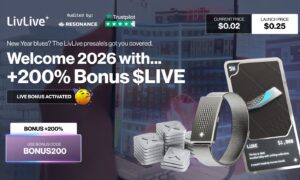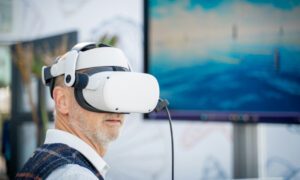The existing retail experience depends on environmentally intensive distribution channels and costly warehouse storage centers. Retail shopping has taken a large hit in the past 5 years and people are finding it hard to make it to retail outlets due to physical restrictions. Store owners are also finding it difficult to compete with rising rental costs and small retail outlets are hard-pressed to stay afloat amidst geopolitical turmoil. The retail experience needs to change.
Serge Gianchandani has been leading the digital transformation of brands for the last 2 decades. He is the co-founder of Metamall, the founder of Egg Solution Optronics, and a serial entrepreneur with 12 patents on 3D and VR imagery. He’s also the founder of Moksha, a firm that has worked with multiple big-name brands including Unilever, Adidas, Levi’s, and Amazon.
I sat down to interview Serge about how the Metamall project is providing an alternative retail experience where profits are rewarded more equitably among all network participants. Metamall offers an integrated retail experience in a VR-enhanced Metaverse.
It’s primarily a place for people to go to have a classical retail experience but also offers benefits for store owners, property developers, investors, advertisers, and VR designers. We talked about tokenomics, the NFTs, Metaverse design, and previous fundraising to get a more well-rounded idea of the project Metamall.
- Can you tell us a little bit about project Metamall?
Metamall is seeking to onboard the retail experience to the Metaverse using a combination of VR, distributed ledgers, cryptocurrencies, and NFTs. This is particularly relevant with the recent level of geo-restrictions across the planet.
For instance, customers can have a truly immersive experience in a shopping arcade and pay for it through our native token, without moving from their home. It reduces the cost for a personalized experience that is enjoyable and lets people connect with each other easily.
It’s really an enhanced retail solution we offer where customers are paying for an experience, not merely a product. Due to the levels of technological sophistication, we can give them this experience for a good price whilst simultaneously catering to other markets like store owners and advertisers.
- What solutions do you offer for investors as opposed to customers?
Investors can purchase and develop land much like physical real estate investment, but with many advantages. We have created land packages from $360 – $43,200 for investors to develop. And these “spaces” can be personalized for whatever type of VR experience you want your customers to have – gaming, shopping, modeling, casinos, VIP lounges, office complexes, etc. There are no rent, utility bills, labor, or material cost. You just work with VR designers to give your customers the experience they are looking for.
There are also other opportunities for in-metaverse advertising and NFT sales – the items you sell to customers in-store. Your NFT can also be flipped just like traditional real estate. Or you can do a “fixer-upper” on an under-valued NFT space. It depends on how creative and imaginative store owners and investors are. The Metamall Metaverse simply offers an unsaturated market with fewer costs for setting up your real estate space/property in a virtual environment.
- Can you explain the tokenomics of Metamall?
The Metamall tokenomics infrastructure is a little different from systems without a functional VR Metaverse. There are two criteria. The first is the native token, MALL. This is the exclusive token used to make purchases within the Metamall Metaverse, which runs on the Solana blockchain. But equally important is the “space”.
You purchase units within the Metaverse as NFTs, and you can design these as you wish while working with VR designer specialists. Currently, there are a total of 5714 “spaces” available as NFTs. These are divided into 5 types – Cubes, Cabins, Clubs, Chalets, and Chateaus. Each of these NFTs offers a different quantity of units. A Cube offers one unit of space for a public price of $360 while a Chalet offers 400 units for $43,200.
- What is the function of the MALL governance token?
The MALL token facilitates transactions within the Metamall Metaverse. If you want to buy or sell something, you transact in MALL. We also provide an integrated and secure wallet for transactions. The transaction itself will be facilitated through smart contracts on the underlying Solana blockchain.
Rewards and prizes will also be distributed in this token, and fees will also be paid through it. After the vesting period is over and all tokens have been released to the market, MALL will be used to vote on community decisions within the wider ecosystem. Property owners automatically get rewarded with MALL tokens from visitors to their property and the token can also be staked for rewards.
- How is the Metamall Metaverse designed?
The Metamall Metaverse is themed as a spaceship. The spaceship is divided into different zones and each zone offers a different experience to customers. The structure allows for a zero-gravity environment with changing views of the cosmos. While the aim is to bring retail to the Metaverse, we’re really striving to enhance the industry in a big way and create new markets based on pure experience.
The biggest determinant of business success is how customers feel through their experience of a given service. We offer a completely new paradigm of experience through the power of VR technology and distributed ledgers. The spaceship theme and zero-gravity environment provide something new. Store owners can also customize their units working with VR specialists to provide a personalized experience, within a personalized experience.
- How did your fundraising campaign go?
We raised $4.6 million from two funding rounds. Our investors included Bluechips Capital, WLI Capital, CCK Ventures, 316 VC, HMS Ventures, and Mars Ventures. Aside from this, our NFT sales generated nearly $2 million and round three IDO launch is expected to raise $400,000 from four separate project launchpads. These funds will be used to further develop the technology, to onboard new specialists to our team, to market our platform, and to scale the architecture.
- What’s next on the roadmap? When can we expect this immersive VR experience to go live?
We are hoping to go live with our minimum viable product (MVP) by April. But up next on the roadmap is a centralized exchange listing, in late February or early March. We are still in discussions with leading exchanges about this listing.
Other milestones we are actively working on include a staking launch, second NFT real estate sale, private VR experience launch, scaling of existing architectures, and the launch of brand stores and experiential centers.
We are already ahead of our roadmap targets and are eagerly developing the future of retail in a Web3 environment.



































